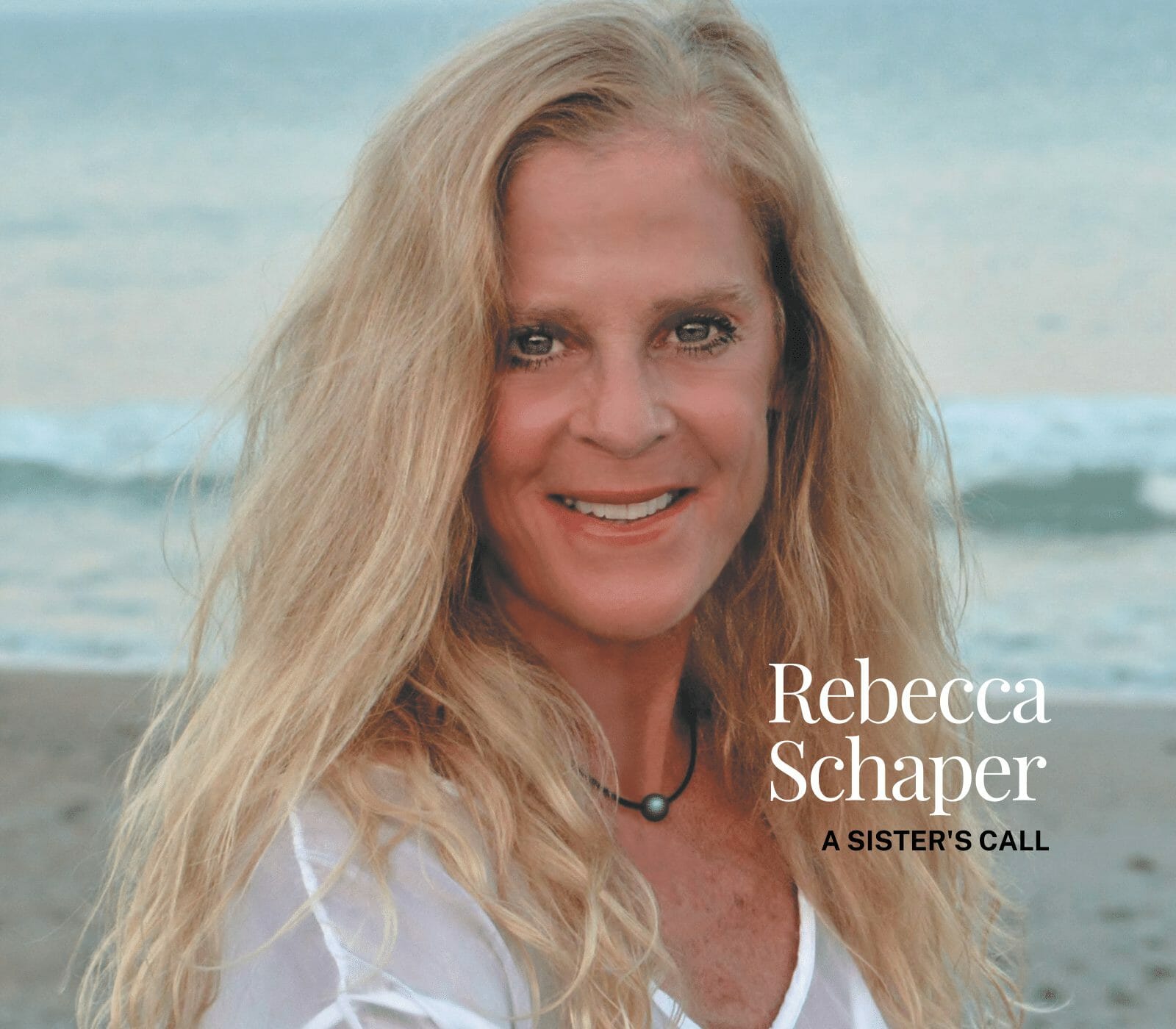Rebecca Schaper: A Sister’s Call

SANDIE SEDGBEER: You hinted in your book that he had some kind of psychic gift. He told you about having heard that your mother was going to kill herself before she did.
REBECCA SCHAPER: Yes. I’ll never forget this. We were filming him, and he was reflecting back, and he said he remembered that he was on the road, standing under a bridge one day when a voice came over him. And it said, ‘I’m going to have to take your mother.’ Two weeks later, our mother died by suicide. Now, he was not on any medication then. So, is that really a hallucination? Or was he tapping into something else? I do believe he was telepathic, as there are other stories.
SANDIE SEDGBEER: Did you ask him, ‘Where did you think that information came from?’
REBECCA SCHAPER: No, because it didn’t dawn on me until later on. But in that interview, he said, “Isn’t that something?’ And then he said, “I never told Becky, and I feel guilty for that.”
SANDIE SEDGBEER: When he relapsed when he wasn’t looking after his apartment or himself, and you had to deal with that, did you ever feel that you might have done the wrong thing? That you were fighting a losing battle. That you couldn’t make him well, you would never be able to help him enough, and it was always going to be like this?
REBECCA SCHAPER: I never felt that this was not the right thing. I knew it was. It was my passion. Some people may see it as being obsessive, but no. I wanted to get him as well as I could, and I had to accept that I had to find a balance. That was hard for me because I didn’t want to lose him like I lost my parents. And that was one of the lessons he was teaching me. Even though he didn’t know it, I knew it.
SANDIE SEDGBEER: Say more about the lessons he was teaching you.
REBECCA SCHAPER: He taught me a lot about patience. I remember him always asking me, ‘Rebecca, how’s your patience?’ I would say, ‘We’re together, right? That should say a lot. He never complained. He lived such a simple life. He loved life. He didn’t have to say much. I learned from that. He was an example of being happy where he was, even though he had this diagnosis.
SANDIE SEDGBEER: Did he ever question the diagnosis? What was his attitude to it?
REBECCA SCHAPER: I asked him. It’s in the film and the book. I said, “Call, how do you feel about this? What would you tell people about it?’ He said, ‘I’d tell them to pray and go see your Doctor.’ We laughed about that. I said, ‘Are you happy? Do you ever regret this?’ He said, ‘No, not at all. I am so thankful for the people who are around me, who love me.’
SANDIE SEDGBEER: The book is very heartfelt and courageous. You expose your life and your family because you want the world to know what it is like to be with somebody in Call’s situation and not see them as broken. There’s a passage in your book that you feel sums up a lot of what you learned from Call. Would you read that to us?
REBECCA SCHAPER: Thank you. I would love to. ‘Today, I felt it was the shared pain of abuse that drew Call and me together in support and healing of each other. It was a powerful underlying subconscious bond. He and I never discussed this, but I felt that it was recognized and acknowledged between us. I heard him. I felt him. I would find the best way to help him as I too wanted to be helped.’
SANDIE SEDGBEER: I’m sure there are many people listening who live with the same things you lived with every single day. I think it’s important for us to see beyond the diagnosis, the shame, and the stigma and look at the person as a soul and what they are going through. You make quite evident in the book and your documentary that the beautiful parts of us are genuine love, humor, compassion, and profound spirituality, are still there even when hidden by illness. I know you loved your brother. I know you were passionate about helping him. With the best will in the world, being a caregiver to somebody in any situation is exceptionally debilitating both physically and emotionally. What kept you going?
REBECCA SCHAPER: Wow, that’s a big question. Passion, love. I can’t really articulate it. I just had this driving force, and maybe that was part of the contract that Call and I had together. I know that when Call and I were together, he would always bring up the word processor, so maybe that was part of the process.
SANDIE SEDGBEER: What did he mean by process? That’s an exciting thing for him to say. He knew there was a process going on.
REBECCA SCHAPER: Yes, and right now we’re going through the process; i’s continuing. I feel that he knew why he was here on this earth and that our relationship, our contract together, was part of the process. When he was in Marshall Pickins hospital, he talked about this ‘process,’ I said to him on film, ‘OK, tell us about the process.’ He said, ‘Well, I signed this contract, and you wouldn’t understand it. It’s in the English language, but it’s translated differently. You wouldn’t understand.’ I said, ‘OK, that’s fine,’ but I couldn’t stop thinking about what contract? Our contract? Is his contract being here? My contract?
SANDIE SEDGBEER: Soul contract?
REBECCA SCHAPER: Yes. Our contract together. Call’s contract with me. His contract with my family. That’s all part of the process.
SANDIE SEDGBEER: One of the things that struck me in the movie is that Call seemed always to have an aura of calm about him. We didn’t see him having rages or getting angry. He seemed patient, almost amused at times as if he was saying, ‘I’m just chilling. everybody else does what they’re doing.’
REBECCA SCHAPER: Yes, exactly. I would be buzzing around, and he would just sit back and say, ‘OK, Rebecca.’
SANDIE SEDGBEER: In many cultures, people that we might dismiss as having mental health issues are loved, lauded, praised, looked after, regarded as a gift to the tribe. Or they’re called Shaman. If we go back into history, there are so many cases of people who openly wrote and spoke about hearing voices, being ecstatic because God talked to them. Why are some of those elevated to sainthood, yet Today we put them in a mental home?
REBECCA SCHAPER: It’s horrible. I have wondered why religion and God seem to be such common themes. Could it be they are merely tapping into other dimensions? I do believe that there are mystic voices here as well. I am in the process of creating with another filmmaker a documentary about the voices of Schizophrenia. We’re exploring and researching mystic voice heroes and more about the voices of Schizophrenia.
SANDIE SEDGBEER: I’m encouraged by the research conducted right now with the microbiome and how certain microbes in our system affect our mood and emotions. Experiments with psychedelics and anxiety and depression, etc.
REBECCA SCHAPER: We’re on the brink of a whole different field of understanding in all of this. Nature, meditation, and yes, food can make a big difference, too. Not to mention family support. And love – that’s huge.
SANDIE SEDGBEER: What are the key lessons that you learned from your experience that could help others?
REBECCA SCHAPER: To have compassion, trust, and to give others hope. And don’t give up. It can be challenging at times, but don’t give up. There’s something to be learned from it all, and you never know what that could be. To those who are taking care of others with mental health issues, I would say, be sure to take of yourself. That’s so important.
SANDIE SEDGBEER: Your hope was for Call to get better. How did you define that? What were you expecting or hoping to see?
REBECCA SCHAPER: In the end, he was stabilized. He stopped smoking. He stopped drinking. He was back to his old self. He was engaged in family activities. He was socializing. We’d go into stores, and people would just gravitate to him. He was like this gentle giant.
SANDIE SEDGBEER: After 14 years of having Call back in your life, he passed? How did that happen?
REBECCA SCHAPER: He had colon cancer. I’ll never forget this. Again, I think this was something telepathic that we had. In March of 2012, something kept telling me I should call him or go see him, but I was on the road doing film festivals, and I didn’t get a chance to have him home with us until July 2012. That’s when we found out that he had colon cancer. I took him to the doctor, and he had very severe edema. When the doctor told Call that he had stage 4 colon cancer and said he was sorry, but Call only had x time to live, Call reached over and shook the doctor’s hand and simply said to him, ‘Thank you for your wisdom.’ That was another lesson for me – to see how my brother was embracing death. He passed away on September 04, 2012. He was in hospice, and my husband and the girls would visit him. And there were so many synchronicities around that situation, it was pretty amazing. I felt like angels were around him, and in fact, Call told me that when he was young, lying in bed one night, he actually saw an angel.
His actual passing was very sacred. My daughter, Lauren, put plugs in Call’s ears so he could listen to his favorite music as he was slowly passing.
Continue to Page 3 of the Interview with Rebecca Schaper
A veteran broadcaster, author, and media consultant, Sandie Sedgbeer brings her incisive interviewing style to a brand new series of radio programs, What Is Going OM on OMTimes Radio, showcasing the world’s leading thinkers, scientists, authors, educators and parenting experts whose ideas are at the cutting edge. A professional journalist who cut her teeth in the ultra-competitive world of British newspapers and magazines, Sandie has interviewed a wide range of personalities from authors, scientists, celebrities, spiritual teachers, and politicians.






